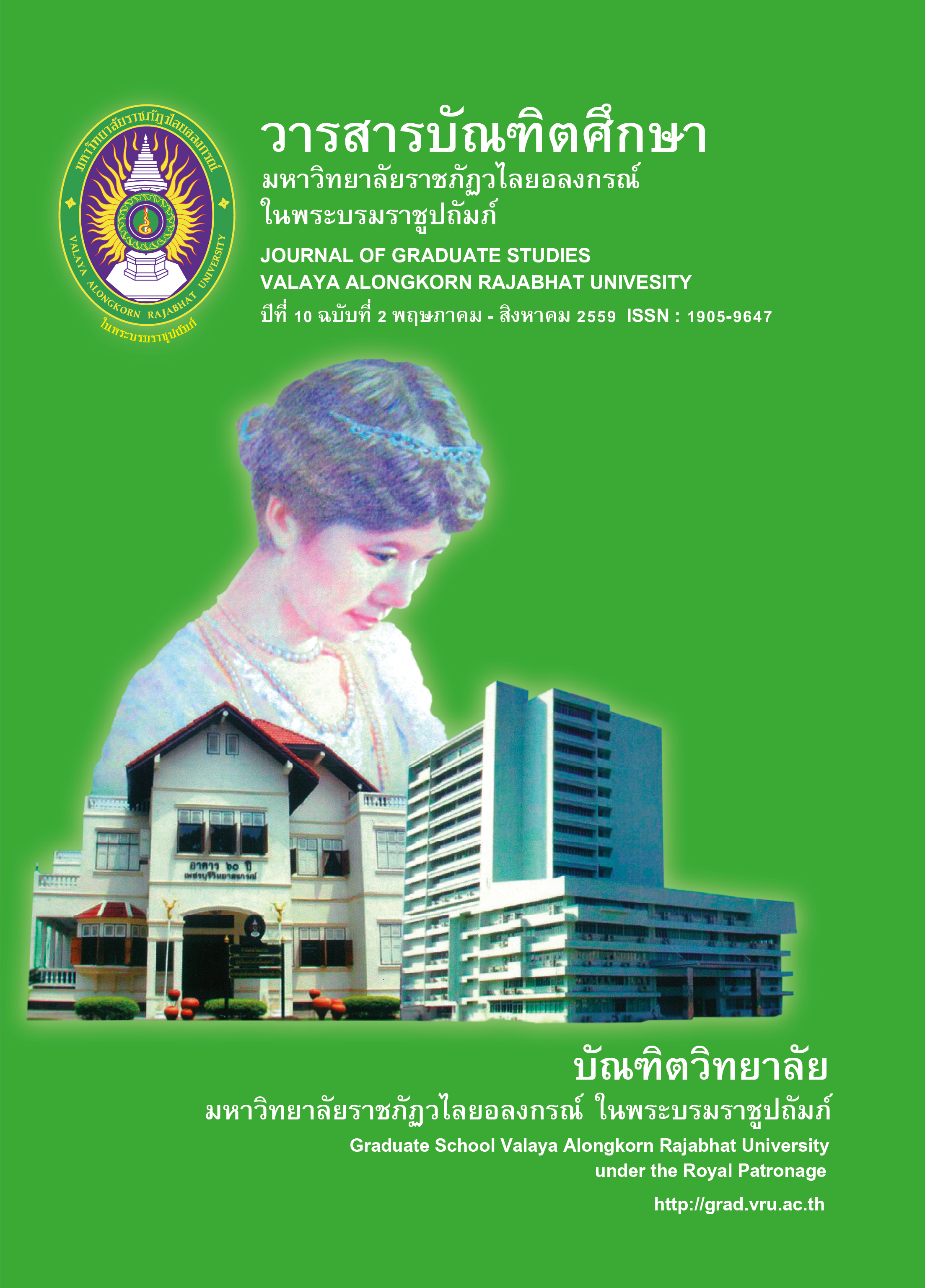การวิเคราะห์หารูปแบบการเรียนรู้โดยใช้เหมืองข้อมูลของนักศึกษาต่อการจัดทำปริญญานิพนธ์
Main Article Content
Abstract
บทคัดย่อ
การจัดการเรียนรู้ให้เหมาะกับรูปแบบการเรียนรู้ของผู้เรียนเป็นปัจจัยที่ทำให้ผู้วิจัยมีความสนใจต่อการหารูปแบบการเรียนรู้โดยยึดหลักทฤษฎีของเดวิด คอล์บ มาศึกษากับนักศึกษาระดับปริญญาตรี สาขาการจัดการเทคโนโลยีการผลิตและสารสนเทศ โดยวิเคราะห์ด้วยการทำเหมืองข้อมูลจากแบบสอบถาม ใช้โปรแกรมเวก้าเป็นเครื่องมือในการวิเคราะห์ เลือกวิธีวิเคราะห์ผลด้วยรูปแบบ Rule Based Classification ด้วยวิธี Decision Table, Jrip และ PART และรูปแบบ Decision Tree Classification ด้วยวิธี LMT, J48 และ Random Tree พร้อมกับวิเคราะห์ตัวแปรด้านเพศ และชั้นปีด้วยวิธี Random Tree เพื่อดูผลการคัดแยกจากโมเดลแผนภาพต้นไม้ จากการวิเคราะห์ผลทั้งหมดพบว่า รูปแบบของ Decision Tree ด้วยวิธีการ Random Tree ให้ค่าความถูกต้องสูงสุด(100%) ทำนายรูปแบบการเรียนรู้เป็นแบบเอกนัย (Converger) ส่วนรูปแบบของ Rule Based ด้วยวิธี PART ให้ค่าความถูกต้องสูงสุด (84.12%) ทำนายรูปแบบการเรียนรู้ของนักศึกษาทั้งหมดเป็นแบบเอกนัยเช่นกัน แต่เมื่อแบ่งตามเพศและชั้นปี พบว่าเพศหญิงจะมีรูปแบบการเรียนรู้แบบเอกนัย ส่วนเพศชายมีการเรียนรู้แบบอเนกนัย (Diverger) และเมื่อพิจารณาจากชั้นปีเลือกดูในชั้นปีที่ 3 ซึ่งเป็นชั้นปีที่ต้องจัดทำปริญญานิพนธ์ พบว่าเพศชายมีเป็นรูปแบบการเรียนรู้แบบอเนกนัยเช่นกัน จึงเหมาะกับการเลือกทำปริญญานิพนธ์ทางด้านการผลิต และสารสนเทศ เน้นเชิงรูปธรรมด้วยการคิดหลายด้าน สร้างเครื่องอุปกรณ์จำลองการผลิต สร้างซอฟต์แวร์ ส่วนเพศหญิงมีรูปแบบการเรียนรู้แบบเอกนัย จึงเหมาะกับการเลือกทำทางด้านการจัดการ เน้นเชิงนามธรรม ปฏิบัติเกี่ยวกับแนวคิด ทฤษฎี ผสมกับการทดลอง รูปแบบจึงเป็นการนำทฤษฎีไปวางแผนหรือทดลองเก็บข้อมูลในสถานประกอบการเพื่อให้เกิดประสิทธิภาพดียิ่งขึ้น
ABSTRACT
The suitable learning management for students’ learning style plays an important role in teaching and learning. This paper aimed to analyze the students’ learning styles which were the students from undergraduate students from Information and Production Technology Management Department by using the David Kolb’s learning styles. The data mining techniques was exercised and Wega program was used as the analysis program. The data analyzed by using a Rule Based Classification with Decision Table , Jrip and PART simulation model and Decision Tree Classification with LMT model, J48 model and Random Tree simulation model. The analyzed data of the students’ learning style found that Decision Tree method in Random tree simulation model gave the most accuracy (100%). The result using these models showed that students had converger learning style. Meanwhile, Rule Based method: PART simulation model also provided the same result having accuracy (84.12%). However, when the data was divided based on sex and students’ academic year, it was found that female students had converger learning style; male students had diverger learning style. When students’ academic year was considered, it was found that male students had converger learning style which can be concluded that the male students’ learning style suit for the production and information technology related senior project which emphasize in critical thinking regarding production simulation and software creation. The female students’ learning style was converger which was proper for the management related senior project emphasize in abstract thinking, experimental planning and applying theory to enhance the workforce efficiency.
Article Details

This work is licensed under a Creative Commons Attribution-NonCommercial-NoDerivatives 4.0 International License.
บทความทุกเรื่องได้รับการตรวจความถูกต้องทางวิชาการโดยผู้ทรงคุณวุฒิ ทรรศนะและข้อคิดเห็นในบทความ Journal of Global of Perspectives in Humanities and Social Sciences (J-GPHSS) มิใช่เป็นทรรศนะและความคิดของผู้จัดทำจึงมิใช่ความรับผิดชอบของบัณฑิตวิทยาลัย มหาวิทยาลัยราชภัฏวไลยอลงกรณ์ ในพระบรมราชูปถัมภ์ กองบรรณาธิการไม่สงวนสิทธิ์การคัดลอก แต่ให้อ้างอิงแหล่งที่มา


